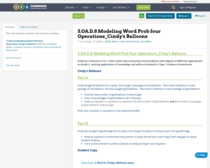Learning Domain: Operations and Algebraic Thinking
Standard: Solve two-step word problems (limited to the whole number system) using the four basic operations. Students should apply the Order of Operations when there are no parentheses to specify a particular order.
Degree of Alignment:
Not Rated
(0 users)
Learning Domain: Operations and Algebraic Thinking
Standard: Solve two-step word problems using the four operations. Represent these problems using equations with a letter standing for the unknown quantity. Assess the reasonableness of answers using mental computation and estimation strategies including rounding. (This standard is limited to problems posed with whole numbers and having whole-number answers; students should know how to perform operations in the conventional order when there are no parentheses to specify a particular order (Order of Operations).)
Degree of Alignment:
Not Rated
(0 users)
Cluster: Solve problems involving the four operations, and identify and explain patterns in arithmetic
Standard: Solve two-step word problems using the four operations. Represent these problems using equations with a letter standing for the unknown quantity. Assess the reasonableness of answers using mental computation and estimation strategies including rounding. (This standard is limited to problems posed with whole numbers and having whole-number answers; students should know how to perform operations in the conventional order when there are no parentheses to specify a particular order (Order of Operations).)
Degree of Alignment:
Not Rated
(0 users)



"RELIGION: Have you considered your own beliefs about religion?
Does this source present Christianity as the sole perspective, standard, or norm?
Does this source depend on a harmful stereotype about religion/faith/spirituality for a complete understanding of the content?
Does this source leave out concepts of religion/faith/spirituality when it could be added for deeper context?
Does the source demonstrate positive religious/faith/spirituality identities for historically marginalized people by highlighting the genius and joy of the identity?
"
Words problems are ripe to include issues of equity and just seamlessly. Word problems give the educator an opportunity to tell a story that students can connect with that would ground their learning even beyond the mathematical processes that are the target. As much as possible, tell the story. The story will help students continue to or begin to think about and see math as a part of their everyday experience and learning about the world rather than a mechanism to figure out problems in a vacuum. This lesson could be enhanced by creating a background story related to religion. At current, the resource is a-religious. That is, the problems are about a general party, but religion could be easily added. This points us to the question in the ID bias tool of: Does this source leave out concepts of religion/faith/spirituality when it could be added for deeper context? It does. An educator might consider adding information about a Bar Mitzvah, Bot Mitzvah, or other traditional celebration to create a story and learn about various religions.